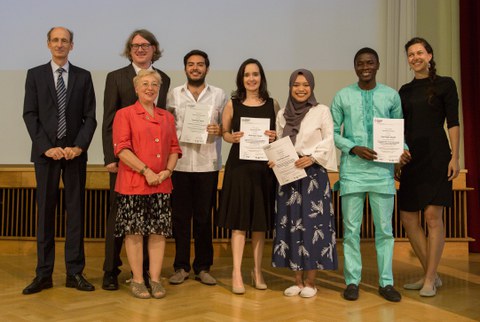Jul 13, 2018
Concept for urban community gardening in Brazilian cities awarded at TU Dresden

Awarding of the "Best Final Paper Award". From left to right: Prof. Dr. Jochen Schanze (TUD), Dr. André Lindner (TUD), Gabriela Königsberg (BMU), Eduardo Francisco Esteves Vélez (Ecuador), Alexandra Aguiar Pedro (Brazil), Vika Ekalestari (Indonesia), Ramoudane Orou Sannou (Benin), Dr. Anna Görner (TUD)
The four most promising action plans of the current CIPSEM postgraduate program are awarded with the "Best Final Paper Award".
The four most promising action plans of the current CIPSEM postgraduate program are awarded with the "Best Final Paper Award".The four most promising action plans of the current CIPSEM postgraduate program are awarded with the "Best Final Paper Award".The four most promising action plans of the current CIPSEM postgraduate program are awarded with the "Best Final Paper Award".
At the closing ceremony of the current postgraduate continuing education program run by UNEP, UNESCO and BMU, at TUD’s Centre for International Postgraduate Studies of Environmental Management (CIPSEM), the "Best Final Paper Award" was granted to four young professionals from Brazil, Ecuador, Indonesia and Benin. The participants received this award for their special contributions to the fields of urban development, land rehabilitation, optimisation of wastewater management and sustainable management of municipal forests. The jury was comprised of the supervising lecturers, the CIPSEM Managing Director Dr. Anna Görner and the Scientific Program Co-ordinator Dr. André Lindner. This award was granted for the fourth time. An important selection criterion is the potential applicability and feasibility of the projects in the participants’ home countries. "It is important to work together to develop innovative ideas and to support promising initiatives in the respective home countries of our participants," says André Lindner. For the course participants, winning this award is an incentive to continue pursuing the application of their project ideas.
From 10th January to 12th July, 2018, the 21 participants from 21 emerging and developing countries, among them Argentina, Myanmar, Ethiopia and Armenia, deepened their expertise in sustainable and environmental management. Participants are representatives and decision-makers from public administrations, non-governmental organisations and research institutes. The course program is designed in the framework of interdisciplinary teaching. They take part in numerous study trips and have the chance to engage with experts in an intensive exchange on their environmental areas of expertise and the challenges they face. At the end of the training, participants present their concepts to the group as well as to their supervising instructors and interested guests. Over 90% of the final papers are practically oriented. The papers serve the participants as a first step to implementing the acquired knowledge in their workplaces after returning to their countries. For instance, the Brazilian prizewinner Alexandra Aguiar Pedro, an architect and urban planner from São Paulo, examined how urban horticulture can contribute to sustainable urban development. For this she surveyed similar projects in Dresden, such as the intercultural garden “Golgi Park” in Hellerau. Pedro examined the potential transferability and effectiveness of a comparable project in Brazil. Among the other winners that presented final papers with promising approaches are Vika Ekalestari, a wastewater expert from the Indonesian Ministry of Public Works and Housing, Eduardo Francisco Esteves Vélez, an agricultural engineer and technical co-ordinator of a non-profit organisation from Ecuador, and Ramoudane Orou Sannou, who works as an agricultural economist for rural development in a non-profit organisation in Benin.
This course program, initiated by the United Nations Environmental Program (UNEP), UNESCO and the Federal Ministry of the Environment, Nature Conservation and Nuclear Safety (BMU) at the Centre for International Postgraduate Studies of Environmental Management (CIPSEM), has been in existence for over 40 years and is dedicated to supporting international continuing education and networking between environmental management experts from developing and emerging countries. Every year, four courses take place and 21 young professionals – decision-makers from public administration but also from non-governmental organisations and research institutions – are invited.
Photo: Awarding of the "Best Final Paper Award". From left to right: Prof. Dr. Jochen Schanze (Chair of Environmental Development and Risk Management – https://tu-dresden.de/bu/umwelt/p-u-r), Dr. André Lindner (CIPSEM), Gabriela Königsberg (Federal Ministry of the Environment, Nature Conservation and Nuclear Safety), Eduardo Francisco Esteves Vélez, (agricultural engineer and technical coordinator of a non-profit organisation in Ecuador), Alexandra Aguiar Pedro (architect and urban planner from Brazil), Vika Ekalestari (wastewater expert from the Indonesian Ministry of Public Works and Housing), Ramoudane Orou Sannou (agricultural economist for rural development in a non-profit organisation in Benin), and Dr. Anna Görner (CIPSEM).
For more information about the current participants of the course program, please visit: https://tu-dresden.de/bu/umwelt/cipsem/unep-unesco-bmu/current-course/current-participants
